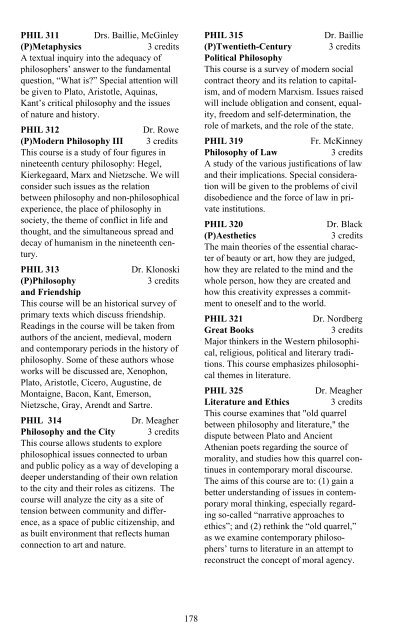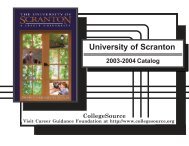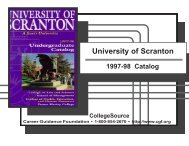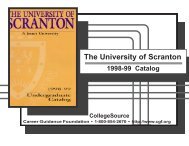1999-2000 - The University of Scranton
1999-2000 - The University of Scranton
1999-2000 - The University of Scranton
You also want an ePaper? Increase the reach of your titles
YUMPU automatically turns print PDFs into web optimized ePapers that Google loves.
PHIL 311 Drs. Baillie, McGinley<br />
(P)Metaphysics 3 credits<br />
A textual inquiry into the adequacy <strong>of</strong><br />
philosophers’ answer to the fundamental<br />
question, “What is?” Special attention will<br />
be given to Plato, Aristotle, Aquinas,<br />
Kant’s critical philosophy and the issues<br />
<strong>of</strong> nature and history.<br />
PHIL 312 Dr. Rowe<br />
(P)Modern Philosophy III 3 credits<br />
This course is a study <strong>of</strong> four figures in<br />
nineteenth century philosophy: Hegel,<br />
Kierkegaard, Marx and Nietzsche. We will<br />
consider such issues as the relation<br />
between philosophy and non-philosophical<br />
experience, the place <strong>of</strong> philosophy in<br />
society, the theme <strong>of</strong> conflict in life and<br />
thought, and the simultaneous spread and<br />
decay <strong>of</strong> humanism in the nineteenth century.<br />
PHIL 313 Dr. Klonoski<br />
(P)Philosophy 3 credits<br />
and Friendship<br />
This course will be an historical survey <strong>of</strong><br />
primary texts which discuss friendship.<br />
Readings in the course will be taken from<br />
authors <strong>of</strong> the ancient, medieval, modern<br />
and contemporary periods in the history <strong>of</strong><br />
philosophy. Some <strong>of</strong> these authors whose<br />
works will be discussed are, Xenophon,<br />
Plato, Aristotle, Cicero, Augustine, de<br />
Montaigne, Bacon, Kant, Emerson,<br />
Nietzsche, Gray, Arendt and Sartre.<br />
PHIL 314 Dr. Meagher<br />
Philosophy and the City 3 credits<br />
This course allows students to explore<br />
philosophical issues connected to urban<br />
and public policy as a way <strong>of</strong> developing a<br />
deeper understanding <strong>of</strong> their own relation<br />
to the city and their roles as citizens. <strong>The</strong><br />
course will analyze the city as a site <strong>of</strong><br />
tension between community and difference,<br />
as a space <strong>of</strong> public citizenship, and<br />
as built environment that reflects human<br />
connection to art and nature.<br />
178<br />
PHIL 315 Dr. Baillie<br />
(P)Twentieth-Century 3 credits<br />
Political Philosophy<br />
This course is a survey <strong>of</strong> modern social<br />
contract theory and its relation to capitalism,<br />
and <strong>of</strong> modern Marxism. Issues raised<br />
will include obligation and consent, equality,<br />
freedom and self-determination, the<br />
role <strong>of</strong> markets, and the role <strong>of</strong> the state.<br />
PHIL 319 Fr. McKinney<br />
Philosophy <strong>of</strong> Law 3 credits<br />
A study <strong>of</strong> the various justifications <strong>of</strong> law<br />
and their implications. Special consideration<br />
will be given to the problems <strong>of</strong> civil<br />
disobedience and the force <strong>of</strong> law in private<br />
institutions.<br />
PHIL 320 Dr. Black<br />
(P)Aesthetics 3 credits<br />
<strong>The</strong> main theories <strong>of</strong> the essential character<br />
<strong>of</strong> beauty or art, how they are judged,<br />
how they are related to the mind and the<br />
whole person, how they are created and<br />
how this creativity expresses a commitment<br />
to oneself and to the world.<br />
PHIL 321 Dr. Nordberg<br />
Great Books 3 credits<br />
Major thinkers in the Western philosophical,<br />
religious, political and literary traditions.<br />
This course emphasizes philosophical<br />
themes in literature.<br />
PHIL 325 Dr. Meagher<br />
Literature and Ethics 3 credits<br />
This course examines that "old quarrel<br />
between philosophy and literature," the<br />
dispute between Plato and Ancient<br />
Athenian poets regarding the source <strong>of</strong><br />
morality, and studies how this quarrel continues<br />
in contemporary moral discourse.<br />
<strong>The</strong> aims <strong>of</strong> this course are to: (1) gain a<br />
better understanding <strong>of</strong> issues in contemporary<br />
moral thinking, especially regarding<br />
so-called “narrative approaches to<br />
ethics”; and (2) rethink the “old quarrel,”<br />
as we examine contemporary philosophers’<br />
turns to literature in an attempt to<br />
reconstruct the concept <strong>of</strong> moral agency.
















